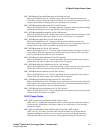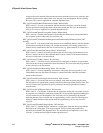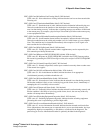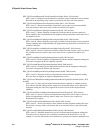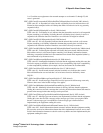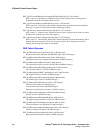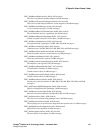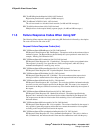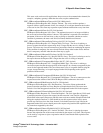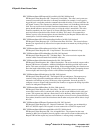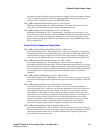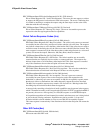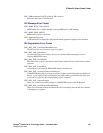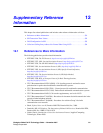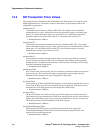Dialogic
®
Global Call IP Technology Guide — November 2007 585
Dialogic Corporation
IP-Specific Event Cause Codes
This status code can be used for applications where access to the communication channel (for
example, a telephony gateway) rather than the callee, requires authentication.
IPEC_SIPReasonStatus408RequestTimeout (0x1520, 5408 decimal)
SIP Request Failure Response 408 - Request Timeout - The server could not produce a
response within a suitable amount of time, for example, if it could not determine the location
of the user in time. The client may repeat the request without modifications at any later time.
IPEC_SIPReasonStatus410Gone (0x1522, 5410 decimal)
SIP Request Failure Response 410 - Gone - The requested resource is no longer available at
the server and no forwarding address is known. This condition is expected to be considered
permanent. If the server does not know, or has no facility to determine, whether or not the
condition is permanent, the status code 404 (Not Found) should be used instead.
IPEC_SIPReasonStatus413RequestEntityTooLarge (0x1525, 5413 decimal)
SIP Request Failure Response 413 - Request Entity Too Large - The server is refusing to
process a request because the request entity-body is larger than the server is willing or able to
process. The server may close the connection to prevent the client from continuing the request.
If the condition is temporary, the server should include a Retry-After header field to indicate
that it is temporary and after what time the client may try again.
IPEC_SIPReasonStatus414RequestUriTooLong (0x1526, 5414 decimal)
SIP Request Failure Response 414 - Request-URI Too Long - The server is refusing to service
the request because the Request-URI is longer than the server is willing to interpret.
IPEC_SIPReasonStatus415UnsupportedMediaType (0x1527, 5415 decimal)
SIP Request Failure Response 415 - Unsupported Media Type - The server is refusing to
service the request because the message body of the request is in a format not supported by the
server for the requested method. The server must return a list of acceptable formats using the
Accept, Accept-Encoding, or Accept-Language header field, depending on the specific
problem with the content.
IPEC_SIPReasonStatus416UnsupportedURIScheme (0x1528, 5416 decimal)
SIP Request Failure Response 416 - Unsupported URI Scheme - The server cannot process the
request because the scheme of the URI in the Request-URI is unknown to the server.
IPEC_SIPReasonStatus420BadExtension (0x153c, 5420 decimal)
SIP Request Failure Response 420 - Bad Extension - The server did not understand the
protocol extension specified in a Proxy-Require or Require header field. The server must
include a list of the unsupported extensions in an Unsupported header field in the response.
IPEC_SIPReasonStatus421ExtensionRequired (0x153d, 5421 decimal)
SIP Request Failure Response 421 - Extension Required - The User Agent Server (UAS) needs
a particular extension to process the request, but this extension is not listed in a Supported
header field in the request. Responses with this status code must contain a Require header field
listing the required extensions. A UAS should not use this response unless it truly cannot
provide any useful service to the client. Instead, if a desirable extension is not listed in the
Supported header field, servers should process the request using baseline SIP capabilities and
any extensions supported by the client.
IPEC_SIPReasonStatus423IntervalTooBrief (0x153f, 5423 decimal)
SIP Request Failure Response 423 - Interval Too Brief - The server is rejecting the request
because the expiration time of the resource refreshed by the request is too short. This response
can be used by a registrar to reject a registration whose Contact header field expiration time
was too small.



